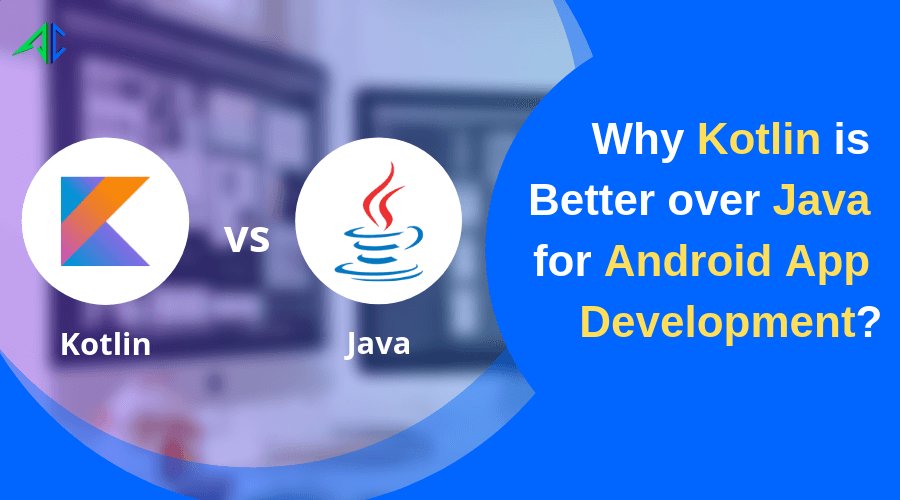Table of Contents
Are you having difficulty in choosing between Kotlin vs Java? This post has got you covered. We’ve listed the pros and cons of Kotlin and Java to help you decide which of the two languages you should pick up for your next Android app development project.
Let’s admit that Android is the most demanded mobile OS with a market share of 85% and over 3 million apps in the Google Play Store. The Android operating system has been grabbing all the attention ever since. Businesses seek a skilled Android app development agency that can develop competitive Android apps and fulfill users’ ever-changing demands. And achieve rapid success in today’s rigorous competition.
However, coming up with the best programming language is the real concern for businesses and even app making companies. The battle of programming languages is always on, whether it’s about Swift vs Objective-C for iOS app development or Java vs Kotlin for Android development. Java is everywhere, and everyone praises it, but the launch of Kotlin has changed a lot. It handles some modern features and has also shaken Java to some extent.
Let’s look into Kotlin and Java language’s pros and cons, compare each and determine which one is the best suited for Android development and why. Ready? We are so!
What Is Kotlin?
Kotlin is a statically typed programming language majorly used for Android app development. It runs on Java Virtual Machine (JVM) and JavaScript, supported by Google and JetBrains. The programming language combines Object Oriented Programming (OOPs) and functional programming in an open, self-sufficient, and unique platform.
According to TechCrunch, Kotlin is now Google’s preferred language for Android app development. Android development will become increasingly Kotlin-first because code-written in Kotlin means less code to type, test, and maintain. Kotlin is clean, relatively simple, and carries fewer formalities and rules compared to other programming languages. To know more about Kotlin language profoundly, check out this post on Kotlin.
Pros of Kotlin Programming Language
- Compiles with Existing Java Code – Kotlin is a 100% Java-compatible programming language. It is consistent with Java. This makes it possible to switch to Kotlin step by step easily.
- Multi-Level Development – Kotlin has opened gates for Gradle Support. Adding Gradle files means Kotlin is positively embracing multi-level development.
- Android Studio Support – Kotlin is powered by Android Studio. This makes it necessary for effortless functionality while installing Kotlin.
- More Reliable – Compared to other programming languages accessible in the market, Kotlin stands as a more efficient and reliable app development language. It has successfully undergone various Beta and Alpha tests so far.
- Easily Maintainable – Kotlin is supported by many IDEs, including Android Studio, and other SDK tools, making it easy to maintain.
- Detects Bugs Easily – As Kotlin offers a clear code base for app development, it makes the coding process more consistent. Developers can easily and immediately find out the bugs and fix them without much problem.
Combines Procedural and Functional Programming – With various programming paradigms available, selecting one is a challenging task. Kotlin effectively combines varied procedural and functional features for effective development.
Cons of Kotlin Programming Language
- Slower Compilation Speed – Many developers have found the issue of slower compilation speed. This makes it one of the notable drawbacks of Kotlin.
- Lesser Kotlin Experts – Kotlin is relatively new to most developers, and that’s why it might be hard to find experienced Kotlin professionals.
- Differ from Java – Being very close to Java, Kotlin still differs in many aspects. A specific learning curve is always there for a developer who wants to switch languages.
What Is Java?
Java is a multi-platform, object-oriented, and statically-typed programming language platform launched in 1995, acquired by Oracle Corporation. Many developers still rely on Java for Android app development as Java is one of the oldest and the most reliable programming languages. Above all, Android itself is written in Java.
The language enables creating a program and supports almost all types of machines, and OS, be it Android, Windows, or Linux. Java boasts the title of the second-most active language on Github because of its great unique offerings.
Pros of Java Programming Language
- Simple and Clear Language – Java is straightforward to use, write, compile, debug, and learn than other programming languages out there in the market.
- High-Level Programming Language – Being a human-readable language, Java is a high-level programming language and has a simple and easy to maintain syntax compared to other programming languages.
- Stability – Java programs are more stable as compared to programs of other languages. Besides, every new version of Java is released with more advanced features, enhancing its permanence.
- Platform-Independent – Java is a portable language due to its platform independence feature. Java code works on the “one code run anywhere” principle; hence can be run on any platform.
- Well-Secured – Java reduces security threats and risks by avoiding the use of explicit pointers. Plus, there is a security manager in Java for each application to define the development’s access rules.
- Memory Allocation – Java has an efficient memory allocation strategy as it divides the memory into two parts – Heap Area and Stack Area. The JVM provides the memory space for any variable, either from the heap area or the stack area.
- Cost-Effective Maintenance – Java programs are inexpensive to develop and maintain as they depend on a specific hardware infrastructure to run. Developers can quickly execute them and reduce the extra cost to maintain.
- Multithreading Support – Java is a multithreaded language that can run more than one thread simultaneously, helping developers gain the maximum CPU utilization.
Cons of Java Programming Language
- Slow and Performance Issue – Java is memory consuming and can get significantly sluggish than other languages sometimes. This slow performance is due to the extra level of compilation and abstraction by the JVM.
- Unattractive Look and Feel – Java has many GUI builders; still, they are not suitable for creating complicated UI. There are so many inconsistencies while using them.
- No Backup Facility – Java mainly works on storage; hence, it doesn’t focus on data backup. A significant drawback that makes it lose interest and ratings among developers.
- Complex Codes – Java codes are redundant, which means there are so many words in them with complex sentences that are unnecessary, difficult to read and understand, resulting in reduced code readability.
The Final Verdict: Which One Should You Choose?
It’s over to you. Both languages come with their strengths and weaknesses. Making the right choice between Java vs Kotlin for your Android app development can be tricky, but you can pick the right one depending on the need of your app. Though Google is steadily gravitating towards Kotlin and gradually getting away from Java, many ask — is Kotlin going to replace Java? Well, the answer is no in the near future!
We would love to hear your comments relating to the post. Got some other thoughts? Drop us words through our contact page.








